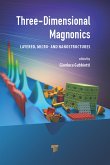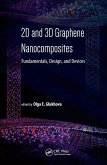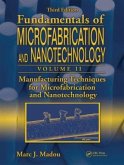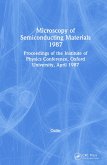Han Zhang, Muhammad Tayyab, Nasir Mahmood Abbasi
Titanium-Based MXenes
From 2D Nanomaterials to 3D Macroassemblies
Han Zhang, Muhammad Tayyab, Nasir Mahmood Abbasi
Titanium-Based MXenes
From 2D Nanomaterials to 3D Macroassemblies
- Gebundenes Buch
- Merkliste
- Auf die Merkliste
- Bewerten Bewerten
- Teilen
- Produkt teilen
- Produkterinnerung
- Produkterinnerung
This book explores titanium-based MXenes, an emergent class of materials with a broad range of properties and potential applications. It introduces 3D MXene assemblies and compares their properties with other well-known two-dimensional materials like graphene and transition metal dichalcogenides.
Andere Kunden interessierten sich auch für
![Convergence of More Moore, More Than Moore and Beyond Moore Convergence of More Moore, More Than Moore and Beyond Moore]() Convergence of More Moore, More Than Moore and Beyond Moore187,99 €
Convergence of More Moore, More Than Moore and Beyond Moore187,99 €![Three-Dimensional Magnonics Three-Dimensional Magnonics]() Three-Dimensional Magnonics187,99 €
Three-Dimensional Magnonics187,99 €![2D and 3D Graphene Nanocomposites 2D and 3D Graphene Nanocomposites]() 2D and 3D Graphene Nanocomposites187,99 €
2D and 3D Graphene Nanocomposites187,99 €![Advanced Mos Devices and Their Circuit Applications Advanced Mos Devices and Their Circuit Applications]() Advanced Mos Devices and Their Circuit Applications119,99 €
Advanced Mos Devices and Their Circuit Applications119,99 €![Manufacturing Techniques for Microfabrication and Nanotechnology Manufacturing Techniques for Microfabrication and Nanotechnology]() Marc J MadouManufacturing Techniques for Microfabrication and Nanotechnology168,99 €
Marc J MadouManufacturing Techniques for Microfabrication and Nanotechnology168,99 €![Design, Fabrication, Properties and Applications of Smart and Advanced Materials Design, Fabrication, Properties and Applications of Smart and Advanced Materials]() Design, Fabrication, Properties and Applications of Smart and Advanced Materials262,99 €
Design, Fabrication, Properties and Applications of Smart and Advanced Materials262,99 €![Microscopy of Semiconducting Materials 1987, Proceedings of the Institute of Physics Conference, Oxford University, April 1987 Microscopy of Semiconducting Materials 1987, Proceedings of the Institute of Physics Conference, Oxford University, April 1987]() A G CullisMicroscopy of Semiconducting Materials 1987, Proceedings of the Institute of Physics Conference, Oxford University, April 1987188,99 €
A G CullisMicroscopy of Semiconducting Materials 1987, Proceedings of the Institute of Physics Conference, Oxford University, April 1987188,99 €-
-
-
This book explores titanium-based MXenes, an emergent class of materials with a broad range of properties and potential applications. It introduces 3D MXene assemblies and compares their properties with other well-known two-dimensional materials like graphene and transition metal dichalcogenides.
Hinweis: Dieser Artikel kann nur an eine deutsche Lieferadresse ausgeliefert werden.
Hinweis: Dieser Artikel kann nur an eine deutsche Lieferadresse ausgeliefert werden.
Produktdetails
- Produktdetails
- Verlag: Taylor & Francis Ltd
- Seitenzahl: 464
- Erscheinungstermin: 8. Juli 2025
- Englisch
- Abmessung: 234mm x 156mm
- ISBN-13: 9781032317359
- ISBN-10: 1032317353
- Artikelnr.: 72802136
- Herstellerkennzeichnung
- Libri GmbH
- Europaallee 1
- 36244 Bad Hersfeld
- gpsr@libri.de
- Verlag: Taylor & Francis Ltd
- Seitenzahl: 464
- Erscheinungstermin: 8. Juli 2025
- Englisch
- Abmessung: 234mm x 156mm
- ISBN-13: 9781032317359
- ISBN-10: 1032317353
- Artikelnr.: 72802136
- Herstellerkennzeichnung
- Libri GmbH
- Europaallee 1
- 36244 Bad Hersfeld
- gpsr@libri.de
Han Zhang received his B.S. degree from Wuhan University in 2006 and Ph.D. from Nanyang Technological University in 2010. He is currently working as a distinguished Professor and Director College of Physics and Optoelectronic Engineering Shenzhen University, Shenzhen 518060, China. His current research is on the ultrafast and nonlinear photonics of two-dimensional materials. He is currently the director of Shenzhen Key Laboratory of 2D Materials and Devices and Shenzhen Engineering Laboratory of Phosphorene and Optoelectronics, Shenzhen University. Nasir Mahmood Abbasi received his master's degree in chemistry from the University of Karachi, Pakistan, and PhD in Chemical Engineering with a focus in nanoscale materials (Morphology and self-assembly of nanomaterial) from Zhejiang University, China in 2016. He worked as a postdoc fellow in the School of Physics and Optoelectronic Engineering at Shenzhen University from June 2019- August 2021. After that worked as a scientist in a collaborative project in Nanjing university Biomedical engineering department (Butch/wang research group https://butchresearch.com) and Research and development unit of Nanjing nuoyuan medical devices company (October 2021 to October 2024). His research interests include hetero-structures and the macro-assemblies of nanoscale materials for their applications in energy, healthcare, and electronics. Muhammad Tayyab obtained his Ph.D. in Material Science and Engineering with a specialization in Magnetic Optoelectronic Materials from Nanjing Tech University,China in 2021, has continued to expand his research pursuits. After serving as a postdoctoral researcher from 2023 oct to 2025 September at Nanjing Tech University, he has extended his expertise to Shenzhen University, China, where he currently holds a postdoctoral position. With a comprehensive background in energy generation, particularly focusing on triboelectric nanogenerators (TENGs) and piezoelectric nanogenerators (PENGs), and batteries as well as diverse interests encompassing sensors and actuators, optoelectronics,flexible electronics, and capacitors, Dr. Tayyab's contributions continue to drive advancements in sustainable energy solutions and advanced materials science. His dual postdoctoral experiences underscore his commitment to interdisciplinary research and collaborative exploration in academia.
0. Front Matter. 1. An Overview Of 2D Ti-Based Mxene. 2. Morphological
engineering of 2D Titanium based Mxene. 3. Defect engineering and physical
properties of Titanium Based Mxene. 4. Application of 2D Ti3C2Tx and Ti2CTx
in sensing, photovoltaics, catalysis, energy storage devices and
biomedicines. 5. Composite structures of 2D MXene with polymers. 6.
Morphological engineering of Mixed dimensional hetrostructures of
Titanium-based Mxene with other 2 D Layered materials. 7. Mixed dimensional
Titanium-based Mxine hetrostructures in supercapacitors and Batteries based
energy storage network. 8. Mixed-dimensional Titanium based structures in
photovoltaics and Catalysis. 9. Preparation of 3D assemblies/structures of
Ti3C2Tx and Ti2CTx and some common 2D assemblies' structures of graphene
and transition metal dichalcogenides (TMDCs) and their properties. 10.
Application 3D assemblies/structures of titanium-based Mxene in sensing,
photovoltaics, and catalysis. 11. Summary and Future Directions.
engineering of 2D Titanium based Mxene. 3. Defect engineering and physical
properties of Titanium Based Mxene. 4. Application of 2D Ti3C2Tx and Ti2CTx
in sensing, photovoltaics, catalysis, energy storage devices and
biomedicines. 5. Composite structures of 2D MXene with polymers. 6.
Morphological engineering of Mixed dimensional hetrostructures of
Titanium-based Mxene with other 2 D Layered materials. 7. Mixed dimensional
Titanium-based Mxine hetrostructures in supercapacitors and Batteries based
energy storage network. 8. Mixed-dimensional Titanium based structures in
photovoltaics and Catalysis. 9. Preparation of 3D assemblies/structures of
Ti3C2Tx and Ti2CTx and some common 2D assemblies' structures of graphene
and transition metal dichalcogenides (TMDCs) and their properties. 10.
Application 3D assemblies/structures of titanium-based Mxene in sensing,
photovoltaics, and catalysis. 11. Summary and Future Directions.
0. Front Matter. 1. An Overview Of 2D Ti-Based Mxene. 2. Morphological
engineering of 2D Titanium based Mxene. 3. Defect engineering and physical
properties of Titanium Based Mxene. 4. Application of 2D Ti3C2Tx and Ti2CTx
in sensing, photovoltaics, catalysis, energy storage devices and
biomedicines. 5. Composite structures of 2D MXene with polymers. 6.
Morphological engineering of Mixed dimensional hetrostructures of
Titanium-based Mxene with other 2 D Layered materials. 7. Mixed dimensional
Titanium-based Mxine hetrostructures in supercapacitors and Batteries based
energy storage network. 8. Mixed-dimensional Titanium based structures in
photovoltaics and Catalysis. 9. Preparation of 3D assemblies/structures of
Ti3C2Tx and Ti2CTx and some common 2D assemblies' structures of graphene
and transition metal dichalcogenides (TMDCs) and their properties. 10.
Application 3D assemblies/structures of titanium-based Mxene in sensing,
photovoltaics, and catalysis. 11. Summary and Future Directions.
engineering of 2D Titanium based Mxene. 3. Defect engineering and physical
properties of Titanium Based Mxene. 4. Application of 2D Ti3C2Tx and Ti2CTx
in sensing, photovoltaics, catalysis, energy storage devices and
biomedicines. 5. Composite structures of 2D MXene with polymers. 6.
Morphological engineering of Mixed dimensional hetrostructures of
Titanium-based Mxene with other 2 D Layered materials. 7. Mixed dimensional
Titanium-based Mxine hetrostructures in supercapacitors and Batteries based
energy storage network. 8. Mixed-dimensional Titanium based structures in
photovoltaics and Catalysis. 9. Preparation of 3D assemblies/structures of
Ti3C2Tx and Ti2CTx and some common 2D assemblies' structures of graphene
and transition metal dichalcogenides (TMDCs) and their properties. 10.
Application 3D assemblies/structures of titanium-based Mxene in sensing,
photovoltaics, and catalysis. 11. Summary and Future Directions.








